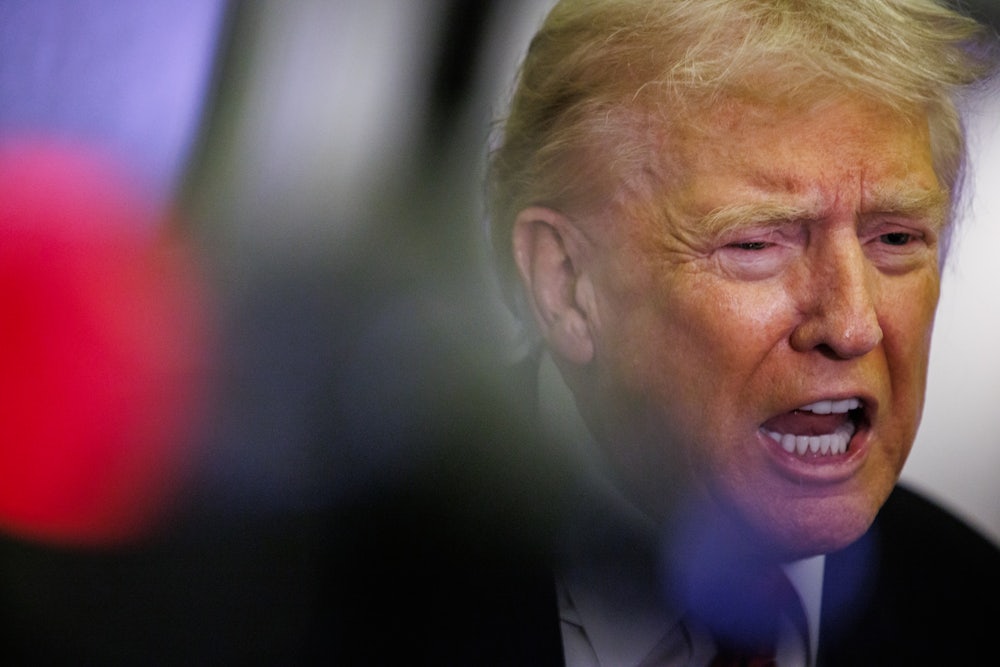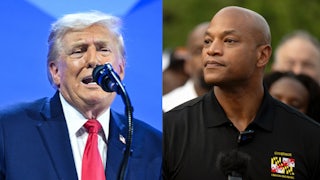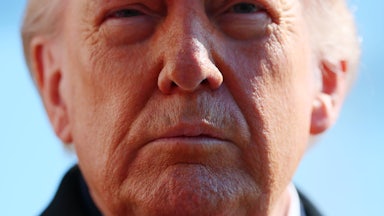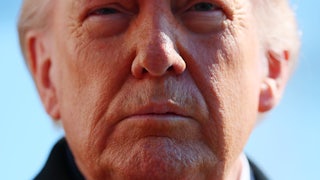President Donald Trump has spent most of 2025 imposing billions of dollars in tariffs on Americans whenever they buy goods from overseas. On Wednesday, the Supreme Court will finally debate whether the centerpiece of Trump’s economic policy is legal. The justices will likely delve into issues of presidential and congressional power, of Cold War–era laws and founding-era principles, and of the precise meanings of words like regulate. Rarely has the court dealt with a case that could so directly affect so many Americans and so many livelihoods at once.
The case, Learning Resources v. Trump, originally came from a group of small businesses that are severely impacted by the tariffs. Unsurprisingly, they argued that the tariffs were flatly illegal. “IEEPA does not authorize tariffs,” they told the justices in their brief, referring to the law at issue in the case. “In the five decades since Congress enacted IEEPA, no president until now has invoked that law (or its predecessor) when imposing tariffs. That is no surprise: Unlike every actual tariff statute, IEEPA nowhere mentions ‘tariffs,’ ‘duties,’ or any other revenue-raising mechanism.”
The businesses managed to persuade the lower federal courts that the tariffs were illegal, prompting the Justice Department to seek relief from the high court. While most of the DOJ’s arguments were legal in nature, it also leaned heavily on Trump’s own claims about the tariffs’ importance on policy grounds.
“To the President, these cases present a stark choice: With tariffs, we are a rich nation; without tariffs, we are a poor nation,” the department claimed in its brief for the court. It quoted Trump as saying that the United States was a “dead country” one year ago and that “now, because of the trillions of dollars being paid by countries that have so badly abused us, America is a strong, financially viable, and respected country again.”
That is a dubious assessment at best. Tariffs, contrary to the administration’s messaging, are not levied on foreign producers or exporters. They are instead paid by American businesses and individuals: either directly if they purchase something from overseas that is shipped to the United States, or indirectly if companies that import foreign goods raise their prices to accommodate the higher costs that tariffs inevitably produce. The Treasury may be richer from the tariff regime, but Americans themselves are not.
Tariffs have always been highly controversial among Americans. The Revolution came in part because the Thirteen Colonies grew frustrated that Parliament kept levying import duties on goods like sugar, paper, and tea without the colonists’ electoral consent, thereby violating a basic principle of English governance. A generation before the Civil War, Southern states and the federal government nearly came to blows over an 1828 tariff that threatened the South’s cotton-based economy. The Smoot-Hawley Act of 1930 imposed tariffs in an effort to protect American industries after Black Monday; they instead deepened and prolonged the Great Depression as trade relationships collapsed.
Because of the colonial-era experience, the Constitution’s Framers vested the power to levy tariffs and similar duties with Congress while simultaneously forbidding the states from enacting their own restrictions on foreign imports. Congress rarely exercises this power today. The Sixteenth Amendment’s passage in 1913 shifted federal revenue toward income taxes instead of import taxes, while the post–World War II economic consensus outside of the Soviet bloc embraced free trade and low barriers to revive the postwar global economy.
Trump’s power to impose tariffs came not from existing legislation but, according to him, from the International Emergency Economic Powers Act of 1977. Congress enacted the Cold War–era law to give presidents a certain amount of flexibility over foreign trade during a declared national emergency. During the Iranian hostage crisis, two years after the law’s passage, for example, President Jimmy Carter used it to freeze Iranian state assets in the United States and block oil imports from the country. Presidents have also used it to impose sanctions for human rights violations or terrorist attacks.
No president had used IEEPA to impose anything resembling tariffs before Trump took office. Since his return to the White House earlier this year, however, Trump has invoked the law multiple times to impose import taxes on China, the largest U.S. trading partner, as well as U.S. allies like Canada, the United Kingdom, and the European Union. The administration’s stated goal is to induce foreign powers to sign trade deals with the U.S. and to stimulate American domestic manufacturing; these efforts have been unsuccessful and even counterproductive so far.
IEEPA makes no mention of tariffs, import taxes, or duties, or anything else along those lines. The Trump administration instead claims that the law’s power to “regulate importations” gives it all the legal authority that it needs. “That IEEPA does not use the word ‘tariff’ is immaterial; this court has repeatedly rejected such magic-words requirements,” the Justice Department claimed in its brief. “Indeed, the court has held that a statute authorizing the President to ‘adjust imports’ includes tariffs, making this an easier case.”
Learning Resources and its allies disagree. The small businesses noted that the Trump administration did not provide any other examples where Congress had “delegated taxing authority through the word ‘regulate’” and that Congress’s phrasing in a World War II–era predecessor statute precluded that reading of it. “When Congress amended the provision after Pearl Harbor to the [eventual] text (‘regulate importation or exportation’), it could not have intended to redefine ‘regulate’ to sweep in the distinct taxing power—and thereby embed a constitutional defect with respect to exports,” they noted. (The Constitution forbids taxes on exports.)
The Trump administration also argued that the courts cannot second-guess its determination. Relying on a famous Truman-era ruling, it claimed that its powers were at their apex because they involved Congress’s delegated power and the executive branch’s inherent powers. The small businesses countered that Congress plainly did not delegate such power to the administration at all.
“When Congress has delegated its taxing power, it has done so clearly—as numerous laws in Title 19 of the United States Code (governing ‘Customs Duties’) confirm—with well-defined limits on its exercise,” they claimed. “The government cannot escape that history by conflating the delegation of Article I taxing power with the President’s Article II foreign-affairs power. After all, the President has no ‘inherent’ taxing authority—even in times of national emergency.”
To reinforce their case, the businesses relied heavily on the court’s “major questions” doctrine. Under that doctrine, Congress must “speak clearly” when delegating powers to the executive branch to address matters of “vast economic and political significance.” If Congress’s grant of power isn’t clear enough, then the court will invalidate it. The Supreme Court used that doctrine over the last few years to block the Centers for Disease Control and Prevention from imposing a moratorium on evictions during the Covid-19 pandemic, to invalidate the Biden administration’s efforts to forgive student loan debt, and to limit the Environmental Protection Agency’s power to regulate carbon emissions from power plants.
The Supreme Court has yet to apply the major questions doctrine to a Republican president’s actions. Trump’s tariff regimes are a great opportunity to do so. The businesses emphasized that the tariffs fell squarely under the doctrine’s scope. “It is also beyond dispute that the ‘economic and political significance’ of the President’s newfound tariff authority is ‘staggering by any measure,’” they argued, quoting from the court’s ruling in the student loan case. “The IEEPA tariffs will affect trillions of dollars of imports, drive small American businesses into bankruptcy, and cost the average American at least $1,000 per year. The impact dwarfs the power claimed in other major question cases.”
To counter this obvious defect, the Trump administration staked everything on a concurring opinion by Justice Brett Kavanaugh earlier this year in an unrelated case. Kavanaugh had opined that the major questions doctrine may not apply to the national security context “because the canon does not reflect ordinary congressional intent in those areas.” The Justice Department contended that since the tariffs were imposed as part of a declared national emergency, that reasoning also applies to them.
It is unclear if Kavanaugh wrote that portion of his opinion with the tariffs in mind, or if the other justices agree with him. The businesses argued it didn’t matter. “At issue here is taxation: one of the most fundamental of Congress’s powers,” they claimed. “When the president assumes powers ‘the Constitution has expressly confided to the Congress and not to the president,’” they wrote, quoting from precedent, “deference is afforded only so long as the President acts under the ‘authorization of Congress.’ That is true even in the national security context.” Here, they emphasized, there was no such authorization.
Though some of these questions can be arcane and technical in nature, they are immense in consequence. The Supreme Court’s decision will have a direct impact on Americans’ pocketbooks and businesses’ prices. It will alter the trajectory of Trump’s presidency—either by giving him the continued power to upend American trade relationships on a whim, sometimes for absurd reasons, or by restoring a sense of normal order to how the federal government imposes tariffs and taxes.
How will the Supreme Court approach these questions? The conservative justices have earned a reputation for extreme deference to the Trump administration over the past nine months. At the same time, if they abide by the precedents and doctrines that they have used to constrain the Obama and Biden administrations, then Trump may be in for a rough ride on Wednesday. Trump himself apparently shares those concerns: He announced higher tariffs on Canada last week over an anti-tariff TV ad from the government of Ontario that ran in the U.S. during the World Series; Trump claimed it was aimed at influencing the justices. Few things could better illustrate how far we have drifted from Congress’s intent with IEEPA than that.








